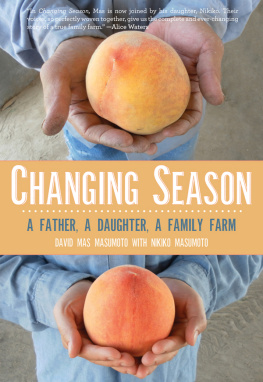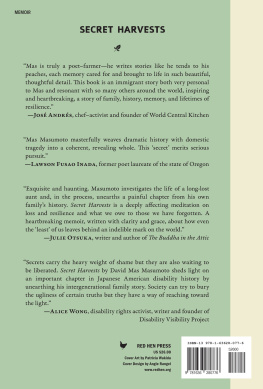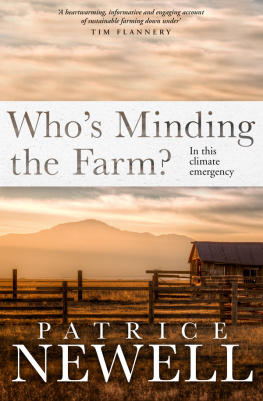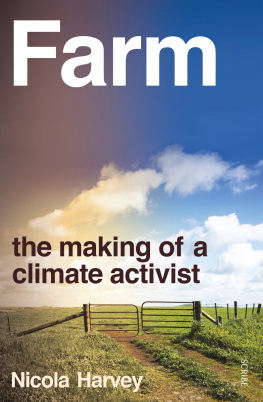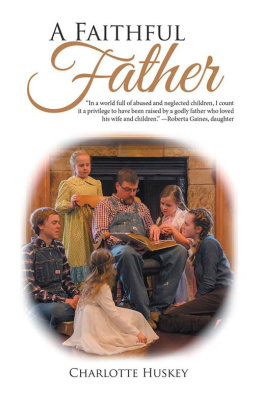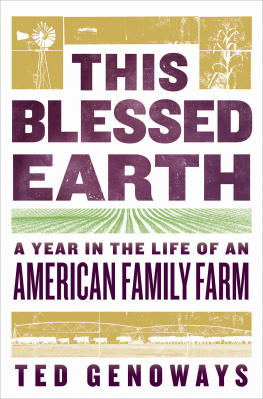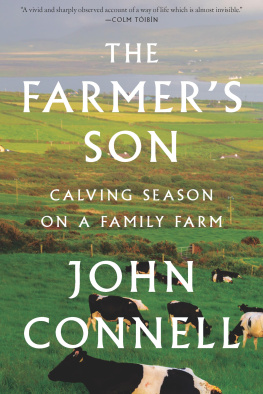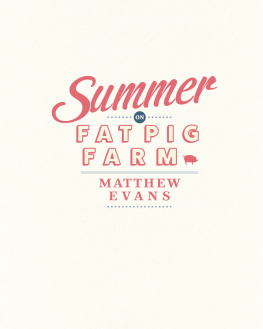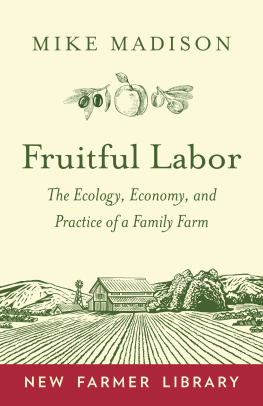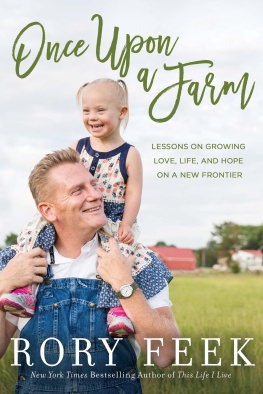CHANGING SEASON
CHANGING SEASON
A FATHER, A DAUGHTER, A FAMILY FARM
DAVID MAS MASUMOTO WITH NIKIKO MASUMOTO
Heyday, Berkeley, California
2016 by David Mas Masumoto and Nikiko Masumoto
All rights reserved. No portion of this work may be reproduced or transmitted in any form or by any means, electronic or mechanical, including photocopying and recording, or by any information storage or retrieval system, without permission in writing from Heyday.
Library of Congress Cataloging-in-Publication Data
Names: Masumoto, David Mas, author. | Masumoto, Nikiko, author.
Title: Changing season : a father, a daughter, a family farm / David Mas Masumoto and Nikiko Masumoto.
Description: Berkeley, California : Heyday, [2016]
Identifiers: LCCN 2016010026 | ISBN 9781597143660 (pbk. : alk. paper)
Subjects: LCSH: Masumoto, David Mas. | Masumoto, Nikiko. | Farmers--California--Del Rey--Biography. | Farm life--California--Del Rey. | Family farms--California--Del Rey.
Classification: LCC SB63.M36 M37 2016 | DDC 630.9794/82--dc23
LC record available at http://lccn.loc.gov/2016010026
Front Cover Photos: Korio Davis Masumoto
Back Cover Photo: Staci Valentine
Book Design: Ashley Ingram
Printed in East Peoria, IL by Versa Press, Inc.
Orders, inquiries, and correspondence should be addressed to:
Heyday
P.O. Box 9145, Berkeley, CA 94709
(510) 549-3564, Fax (510) 549-1889
www.heydaybooks.com
10 9 8 7 6 5 4 3 2 1
To my mom,
who worries every season.
You will always be part of this farm.
D.M.M.
To my jiichan;
I miss you every day.
N.M.
CONTENTS
PREFACE
David Mas Masumoto:
In 2013, the Center for Asian American Media asked if my family would be interested in participating in a documentary film. Naturally, my first response was, About us? Really? A film about a farmer? Who would want to see that?
We werent that special. We didnt have a dramatic story. An evil bank was not foreclosing on our farm, and we were not on the verge of financial collapse. The drought had not wiped us out; we were not displaced Great Depressionera Migrant Mothers. No one in the family had a tragic past or a heartwarming tale of survival that could be picturesquely set on an organic farm with morning dew kissing the leaves. We are not Duck Dynasty with Asian faces. None of us has committed a major crime. No Ponzi peach schemes here. Marcy, my wife, was not leaving me; there was no wild love triangle, no sordid sagas of murder or blackmail. This was not farming in Fargo.
A film about us would lack the dramatic pop and flashy hook audiences have come to expect. All we had were our stories. I concluded that the proposed film would not be about us but rather about the farm, about real dirt. The stars would be the peachesthe alluringly fat and ripe peaches that invite foodies to bite into their sweet flesh and feel the juices slowly slide down their cheeks to dangle on their chins. This could work. Sex sells, and our fruits would be movie stars: food porn from the Masumoto family farm.
I was wrong. The film ended up being about us after all. We exposed our lives, our history, our family, our struggles and challenges and smiles and laughter. It was about the everyday and the authentic. The film was anchored in story, a natural extension of what I have been doing for much of my life: writing. A major part of the unscripted narrative was the return of my daughter, Nikiko, to take over the farm, her voice and identity as a queer woman becoming part of the fabric of our family. They titled the film Changing Season on the Masumoto Family Farm.
Think of this book as an extension of and companion to the film. Each complements the other, but they both also stand alone. Each is born from a common desire to explore real lives and real stories.
The film took two years to make, including thirteen visits to the farm and other venues, each lasting multiple days over the course of all four seasons. This book was written over a period of six years, much of the material drawn from my monthly newspaper columns for the Fresno and Sacramento Bees.
After most of the filming was complete, I had a brief talk with the films director, Jim Choi, and the editor, Chihiro Wimbush. They mentioned the term cinma vrit, but refused to elaborate, fearing too much explanation might ruin the authenticity and spontaneity. Only later I learned this was a documentary filmmaking method that allowed the story to unfold without a narratorthe camera recording real events and actual persons without directorial control. Its very similar to how I write, and how I approach life. In fact, it reminds me of our farm business plan: we never had one. We fell into organic farming in the 1980s, well before organic markets were established, because it felt like the right thing to do. As the organic community matured, we were in the right place at the right time. Luck. Good fortune. Good karma. No script.
I have always written creative nonfiction, and most often in the first-person voice. I use the word I a lot. This is how I see the world. I cant make things upa tough constraint when reality doesnt make sense. Im stuck with the truth. I cant make myself taller or wiser. I cant change my past, nor do I want to alter the history of people around me; were bound by the ties that bind us.
Ive also learned that the process of making a documentary is similar to how I approach writing. We explore. We probe. We understand. Were stimulated by the real world. We are revealed.
Changing Season the book is divided into three sections: the past, the present, and the future. Nikikos voice figures in each section, her field notes adding another perspective, a fresh point of view. We are lost and confused; we question, challenge, grow with self-doubt; we sense a maturity with the passing of years. We share the same journey, a generation apart, marked by different realities. And were still trying to figure it all out.
Im not sure when the documentary began to take shape in the filmmakers minds, but this book has been within me for a long time. The words you read here gradually evolved from a collection of stories into a narrative exploring traditions and change. And, hopefully, legacy.
If were lucky, the reader and the film viewer will judge us kindly. We hope they dont leave asking, Why did they make that film/write that book? Instead, they will feel that stories can indeed fill a book and complete a film.
Nikiko Masumoto:
I realize that we Masumotos have a tendency to reach toward the profound. Maybe its part of living in the legacy of family. Maybe its part of the essence of who we are. Whatever the reason, I hope you find something earnest in our reflections.
My life has been so full of powerful moments experienced while living and working on my familys farm. Sometimes the abundance of wisdom is so large that laughter and tears seem like best friends. I have walked in our fields in silence so full I can feel my inhale reach my toes. I have stood on a tractor with my arms extended in victory, whooping and hollering to myself after accomplishing some small feat, like making a difficult maneuver with a large piece of equipment, or avoiding getting stuck in the mud. These experiences have changed and challenged everything about me. But why should I share these stories?
I feel compelled to share. On a personal level, the practice of crafting stories and transforming experiences into narrative is a fundamental part of how I understand my own life. More importantly, I feel an honorable responsibility to share because what we do is linked to so many lives beyond our own. While our stories are grounded in the specifics of our family and our farm, I hope they resonate wider, building bridges between our differences. I hope they inspire introspection and connection. I must believe that all of the gifts I have received from this life are not only worthy of sharing but must be shared. The food we grow already connects us as farmers and eaters; our consciousness and our humanity should follow.
Next page
